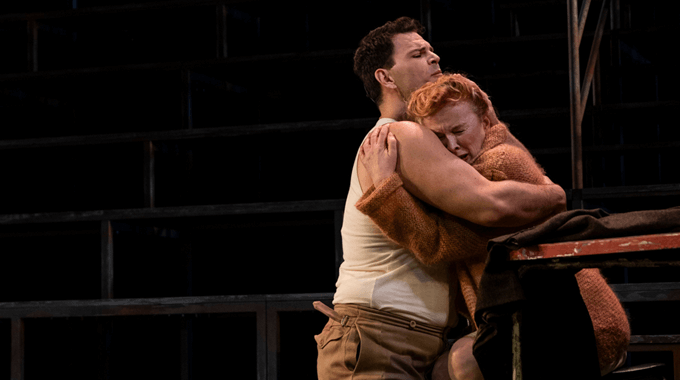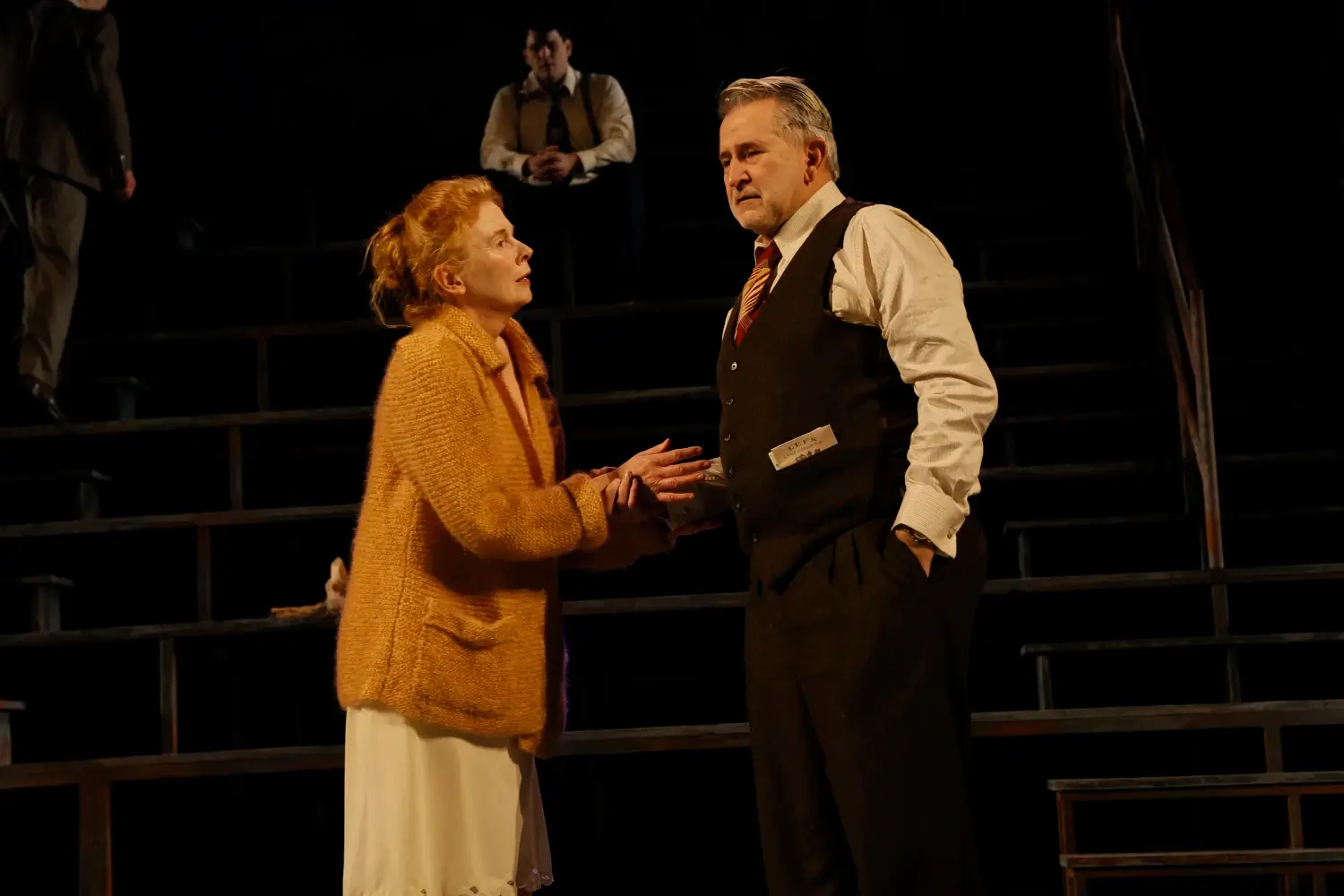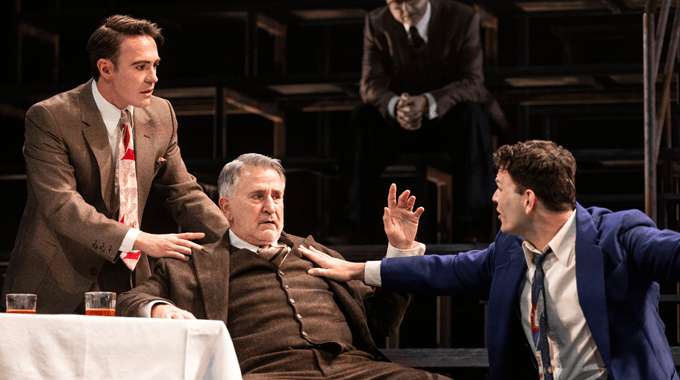Death of a Salesman - Theatre Royal (NSW)
Written by Arthur Miller. Directed by Neil Armfield.
A timely reminder of the death knell that capitalism rings for many in the working class, Arthur Miler's classic is not so much reinvigorated, but performed with a brutal honesty
Reviewed by Justin Clarke
Theatre Royal Sydney
Until 23rd June, 2024
Much of the playwriting in 20th century America, particularly after both World Wars, focused on the idealism of the all-encompassing American Dream. They captured its bountiful promises, as well as its flawed capitalist systems that benefited only the rich (and white for that matter) of the upper-class systems, leaving those in the working class and below to salvage for scraps. Arthur Miller’s Death of a Salesman captures the casualties of The Dream in a way that has resonated throughout the theatre world since its 1949 debut in New York City. Audiences have come time and again to watch the tragic hero, Willy Loman, die and yet Miller’s text ironically refuses to leave the zeitgeist of our ever-changing world.
The title itself is layered in metaphor. The “death” of the salesman we’ve come to see is Willy Loman (Anthony LaPaglia in his Australian mainstage debut) an ageing travelling salesman, hocking a product we never get to see. Willy is the product, he is ultimately selling himself, and with this comes the eventual moment when he is unrecognised by newcomers in the towns he travels to and faces redundancy in an industry changing with the times. “A salesman has got to dream, boy. It comes with the territory.” says Willy’s neighbour, Charley (Marco Chiappi). Miller reflects that Willy is the embodiment of the working-class man’s American Dream and the “death” of the play is the death of the idealism that comes when The Dream fails to deliver to those who need it most. Without this, Willy is a lost soul with nothing left but his decaying memories and a desperate desire for legacy. “Attention has to be paid” says his wife, Linda Loman (played astonishingly by Alison Whyte) for without it, the man we see before us will crumble into non-existence.
Death of a Salesman, Sydney Theatre Royal (2024). Images by Jeff Busby and Brett Boardman
Having won a Tony Award for his work in A View from the Bridge, LaPaglia is no stranger to Miller’s work. From his very first entrance as he shuffles unevenly across the stage, his characterisation is grounded in nuance and gravitas. He is a man defeated, both by the system in which he’s devoted his life, but also by his own ego and hubris. In this manner, he is Miller’s tragic Greek hero. Known for his work mostly on the silver screens, LaPaglia is a cemented theatrical force throughout Salesman, his Brooklyn accent is both grave and ill, flipping to brutality to combat the characters around him, as well as his decaying mind, at a moment’s notice.
Looking down on Willy throughout the play sits the cast of characters in his life. Dale Ferguson’s set design is static, resembling one side of the bleachers of a football field with a commentary box up top. It reflects both Willy’s idolisation of his son, Biff’s (Josh Helman) one significant sporting triumph that he refuses to let go of, as well as the industrialisation around his and Linda’s family home in suburban Brooklyn. It makes for awkward blocking in key moments and doesn’t fully allow the audience to grasp when and where in time we are, as Willy’s memories co-exist in both past and present. Niklas Pajanti’s lighting design feels underplayed and struggles to assist in this matter also. Some of the most effective parts came from isolating moments of tension, and ghostly apparitions by Willy’s late brother, Ben (Anthony Phelan).
[Alison] Whyte’s performance of Linda Loman is staggeringly captivating.
Neil Armfield’s direction plays with fluidity and simplicity. He utilises his cast of actors well; from those looking down teasingly and mournfully from the bleachers to Willy’s immediate family as they struggle to both break free from and reconcile with his decaying life. There is no drastic reimagination here, instead Armfield allows Miller’s tragedy in his language to take shape through the physicality and raw emotion of the four Lomans. That’s not to say that the production couldn’t do without a few energetic punches here and there, the first act drags in comparison to the meaty dialogue of the second.
As the blindly devoted wife to Willy, Whyte’s performance of Linda Loman is staggeringly captivating. While most of Miller’s script remains untouched by time, the treatment (or mistreatment) of the female characters leaves audiences groaning and tittering. Nonetheless, Whyte captures a woman of devotion; she alone sees what she has to gain with her love for Willy, as well as what she has to lose. “We’re free”, she repeats three times at the play’s closing, offering multilayered meaning in each utterance. The treatment of how we see women reflected in plays like this remains tiresome and offers a thankful view of how far we have come as a society, but also a disturbing realisation of how far we have left to go.
As the play hurtles to its promised ending, we’re here to bear witness to, the death of the salesman is still brutally tragic.
Playing the Loman sons Biff and Happy, Helman and Ben O’Toole embody the two sides of the coin that their father has crafted for them. Helman’s Biff journeys from childishly idolising his father, a God in his world that ultimately crumbles before his very eyes. His inability to escape his father’s delusions about his potential and the life he laid out for him comes to a head in a snivelling confrontation in the second act with Helman reflecting the fragility of Biff’s character. Meanwhile O’Toole revels in the comedic timing of Happy, the forgotten son who is quite literally dismissed by both his father and mother, but ultimately is doomed to follow in the footsteps of Willy as he seeks the attention of his parents' respect.
As the play hurtles to its promised ending, we’re here to bear witness to, the death of the salesman is still brutally tragic. Arthur Miller’s piece proves itself to be astoundingly resonant in a time in which we fight against the rising costs of living, the takeover of social media and the home front ripples of world events that are swiftly shaping our modern world. The desire for legacy and financial freedom is one that will never go away, and the death knell of many under the thumb of capitalism can still be heard echoing outside the theatre doors.
Death of a Salesman
Theatre Royal Sydney
CAST
ANTHONY LAPAGLIA Willy Loman
ALISON WHYTE Linda Loman
JOSH HELMAN Biff Loman
BEN O'TOOLE Happy Loman
ANTHONY PHELAN Ben Loman
AISHA AIDARA Letta/Jenny
PAULA ARUNDELL The Woman
ELIZABETH BLACKMORE Miss Forsythe
MARCO CHIAPPI Charley
SIMON MAIDEN Howard
GRANT PIRO Stanley
TOM STOKES Bernard
GLENN HAZELDINE Offstage Cover
KATE SKINNER Offstage Cover
DAMIEN STROUTHOS Offstage Cover
CREATIVE TEAM
Director NEIL ARMFIELD
Set Design DALE FERGUSON
Composer ALAN JOHN
Costume Design DALE FERGUSON & SOPHIE WOODWARD
Lighting Designer NIKLAS PAJANTI
Sound Designer DAVID TONION
Resident Director THERÈSA BORG

%20(1).png)























Comentarios